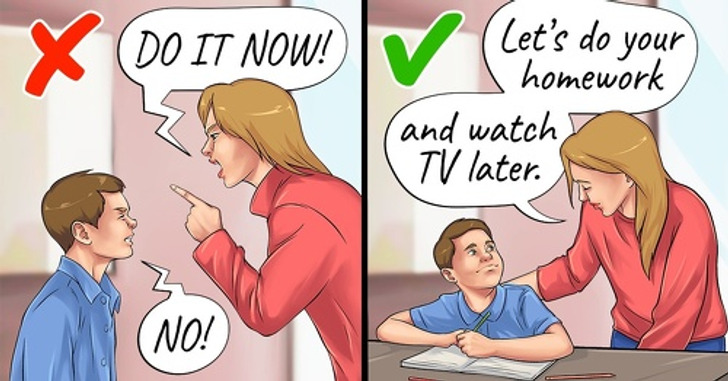5 Ways to Teach Stubborn Kids to Listen Without Yelling, Bribes, or Threats
Parents can love their kids deeply, but they can also find themselves frustrated with the lack of cooperation they receive. It turns out that there are many ways parents unwittingly make it harder to get their little ones to listen to them. In fact, it may be a 2-way street since a recent survey reveals that 62% of children believe that their parents are too distracted to listen. The good news is that there are ways to make your children listen to you, set healthy boundaries, and make parenthood a little bit easier.
The Bright Side team went on a quest to make parenting a little easier for you and gather the most common missteps parents make that can accidentally teach their kids to not listen to them, and expert advice on how to change that.
1. Engaging in power struggles

A power struggle occurs when 2 people compete for control in a particular situation. This rebellious behavior takes place when a child refuses to do something you ask or follow a rule you have set. Often, the resistance stems from simply wanting to control or exert power and has less to do with the request itself.
To avoid this unhealthy dynamic, you should disengage right after it happens and create win-win situations in the future.
2. Wording your expectations as commands
When we command someone to do something, we don’t give them an opportunity to think. Instead, we give them a chance to either obey or disobey, and they just have 2 options. Though we may add the magic words “please” and “thank you” to soften our words, it’s still an order at the end of the day.
Instead of using commands, try using phrases that start with, “I really need you...” For example, “I really need you to put your shoes on so that we can leave for school.” Another technique is to use the power of suggestion. Instead of saying, “Vacuum the rug,” simply tell them, “There are crumbs on the floor.”
3. Making meaningless threats
Parents often make the mistake of threatening their children with consequences they don’t intend to follow through on. You’re basically teaching your children that they don’t need to listen to you because they don’t believe the consequences are real. Even a joking threat can harm the trust between parent and child.
Instead of making empty threats, lay out clear standards of behavior and practical consequences that you will carry through with. Instead of making an exaggerated threat like, “You’ll never be allowed to go outside again if you don’t make your bed right now!” tell them, “I am afraid you won’t be able to stay up late this Friday if you don’t make your bed.”
4. Raising your voice
When parents raise their voices, children may become fearful and believe they are in danger. These feelings can lead to low self-esteem. Moreover, when they hear the anger in a parent’s voice, they may become angry themselves. Rather than constructive communication, in which both parties understand the other’s perspective and collaborate to find a solution, we are met with escalating yelling from both sides.
To avoid this tendency, find room for negotiation and turn the argument into a healthy discussion. Instead of yelling at your children to do their homework, try saying, “What if you got 20 minutes of iPad time before homework?”
5. Repeating yourself

Repetition, in and of itself, is not a particularly undesirable thing. It can be extremely helpful to repeat instructions or requests that your child may need a little extra time to learn.
If, however, you’re repeating yourself because your child just doesn’t listen, then that’s frustrating for them and confusing. It can create unnecessary anxiety and frustration for both parties if you repeat yourself or nag them repeatedly. Also, it teaches them the wrong lesson. This means that you teach your kids to repeat the unwanted behaviors by repeating requests that have no consequence attached.
What are other ways in which parents accidentally teach their kids to misbehave? What is the advice you would give to new parents? Let us know in the comments.


